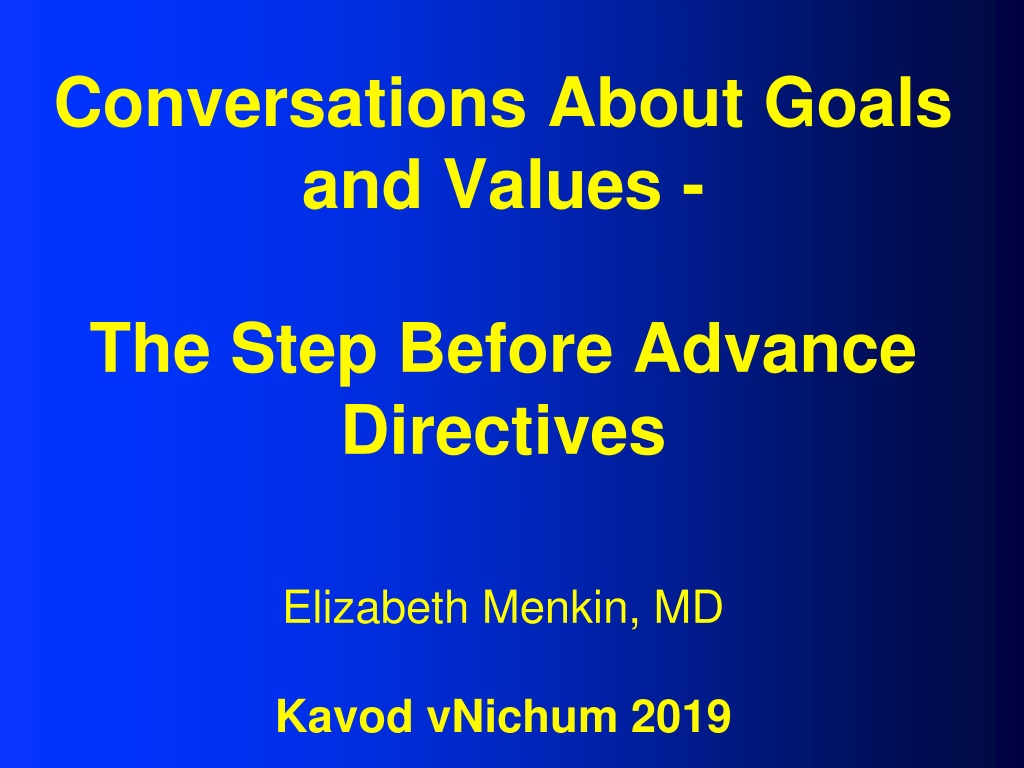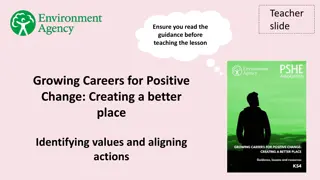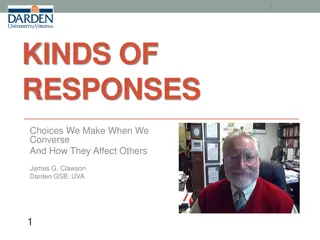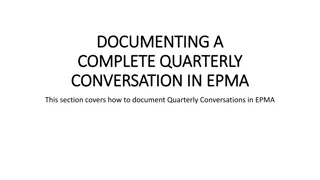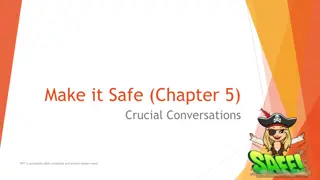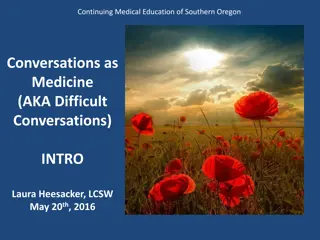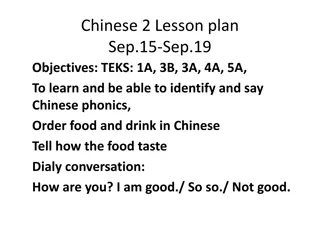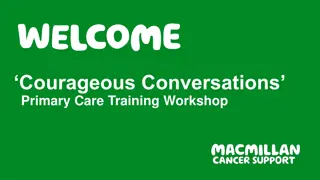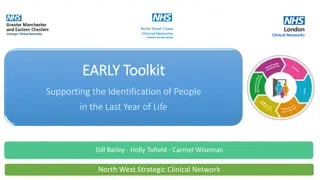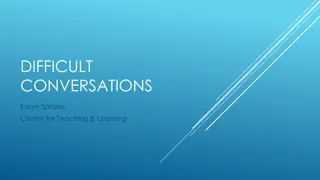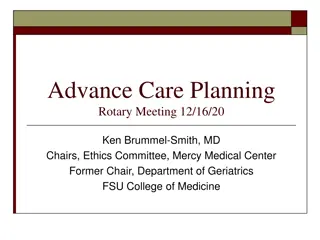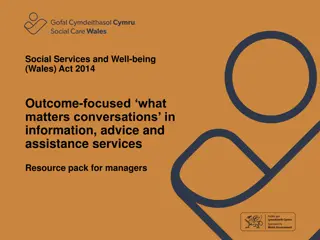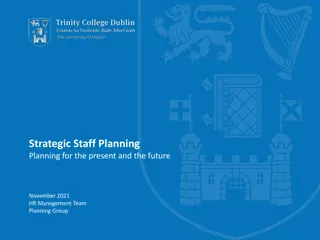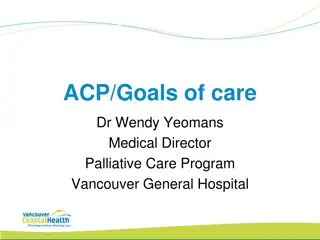Conversations About Goals and Values in Care Planning
Appreciate the challenges in advance vs current care planning, understand cultural influences, and differentiate shared decision making from shared conversations. Explore the care planning timeline, contract aspects, and the importance of informed consent. Dive into decision-making processes, realistic ACP, and meaningful conversations to empower decision-makers.
Uploaded on Sep 25, 2024 | 0 Views
Download Presentation

Please find below an Image/Link to download the presentation.
The content on the website is provided AS IS for your information and personal use only. It may not be sold, licensed, or shared on other websites without obtaining consent from the author. Download presentation by click this link. If you encounter any issues during the download, it is possible that the publisher has removed the file from their server.
E N D
Presentation Transcript
Conversations About Goals and Values - The Step Before Advance Directives Elizabeth Menkin, MD Kavod vNichum 2019
Prime Points Appreciate the different challenges in Advance vs Current care planning Understand how the cultural differences between patients and medical providers influnce approaches to care planning Differentiate between Shared Decision Making and Shared Conversations
Care Planning Timeline Advance Care Planning Current Care Planning Surrogate involvement Diagnosis Death Capacity Loss
Contract Covenant Autonomy Relationships Concerns of dying patients and their family members Concerns of Law and Ethics Pre-making treatment decisions Defining what matters most
Advance Care Planning Does NOT mean pre-making treatment decisions ! Informed Consent for each and any treatment should mean there has been a discussion of benefits, burdens, goals, potential unintended consequences, and alternatives (including no treatment ) You can t have informed consent when you don t have the current context of the treatment decision.
Decision-Making What do we do? What treatments do I order? Which interventions are off-limits? I need to write orders, and move on! What do you want us to do? What do we do? How do we cope? What is the right thing? What can we hope for? I need to live with this! What can we do?
Realistic ACP Define the intended decision-making process: Who gets the information, and how? Who are the surrogate/collaborative decision-makers? Designate, Inform and Empower them!
Decision-Making Conversation What do we do? Acknowledge affective issues Define what s important Define what s achievable Mourn the unachievable This is what is likely to help... What do we do? How do we cope? What is the right thing? What can we hope for? I need to live with this! What can we do?
What is important? To be free from pain To be free from anxiety To be free from shortness of breath To be kept clean Having physical touch Having financial affairs in order Family is prepared for my death Dying at home Knowing what to expect about physical changes To achieve a sense of completion about my life Saying goodbye to important people Remembering personal accomplishments Resolving unfinished business To make my own decisions about treatment preferences Having treatment preferences in writing Naming someone to make decisions in the event that I cannot Having an advocate who knows my values and priorities Having the written directive on hand when treatment decisions need to be made Having my treatment preferences honored Maintaining my dignity Maintaining a sense of humor Having a physician who knows me as a whole person Presence of close friends Not dying alone Having someone who will listen Trusting my physician Having a nurse with whom I feel comfortable Knowing that my physician is comfortable talking about death and dying Having a physician with whom I can discuss personal fears Being mentally aware Having funeral arrangements planned Not being a burden to family and society Being able to help others Coming to peace with God Praying Not being connected to machines Discussing personal fears Meeting with clergy or chaplain Having a chance to talk about the meaning of death Presence of family
Are there particularly Jewish Goals of Care? What is important Jewishly to have a good life even at the end of life? To be able to perform mitvot with kavanah To have an abiding sense of gratitude To eat and enjoy food Other
What Matters Most? Tools to help you contemplate, articulate, and communicate Who among your loved ones and friends can cope with these discussions (now and in the future)? Who would be a hinderance to values- based decision-making? ( The black sheep on a white horse )
Realistic ACP Define the intended decision-making process: Who gets the information, and how? Who are the surrogate/collaborative decision-makers? Designate, Inform and Empower them!
I know it when I see it: Identifying Hopes, Goals, and Priorities for End-of-life Care
What Matters Most? Tools to help you contemplate, articulate, and communicate Who among your loved ones and friends can cope with these discussions (now and in the future)? Who would be a hinderance to values- based decision-making? ( The black sheep on a white horse )
Goals of tool use Stimulate discussion of wishes and values Encourage thinking about priorities Identify possible positive goals
Challenges in execution Population (actual): Average age 90. Impaired hearing, vision, dexterity, executive functions, attention spans, memory Attendants: culture, language
Goals of tool use - 2 Use with challenging audiences - with disabilities (vision, hearing, mild cognitive impairment) - those who do not have English as a primary language.
Go Wish as a Card Game Emphasize thought and discussion rather than documents Positive tone of content Choosing is easier than thinking from scratch Open-ended (Wild Card)
Case examples - ACP Newlywed Game Surrogate preparation Group demos: community, learners, & leaders
Case examples - CCP No surrogate Don t tell mom Multiple family issues Intubated in the ICU
What should be added ? What are particularly Jewish wild cards
Go Wish Card Sort Step 1. Sort your cards into three piles A. Very important B. Somewhat important* C. Not so important or Unimportant * Perhaps important, but not right NOW
Go Wish Card Sort Step 2. From your Very Important pile of cards, select the Top Ten most important to you Step 3. RANK the Top Ten in priority order with #1 being the most important to you
What is important Jewishly to have a good life, even at the end of life? To be able to perform mitvot with kavanah To have an abiding sense of gratitude To eat and enjoy food Other (Think of a Jewish wild card)
Pair up with someone and explain your top 5 cards
Articles Menkin, E: Go Wish: A Tool for End-of- Life Care Conversations. J Pall Med 2007;10(2):297-303. Steinhauser K, Christakis NA, Clipp EC, McNeilly M, McIntyre L, Tulsky JA: Factors considered important at the end of life by patients, family, physicians, and other care providers. JAMA 2000;284:2476 2482.
Go Wish cards Game sets in all 4 colors are available at www.codaalliance.org (Coda Alliance is a not-for-profit community coalition for end-of-life care) OR www.gowish.org
Thank you Elizabeth Menkin, MD esmenkin@gmail.com www.codaalliance.org
